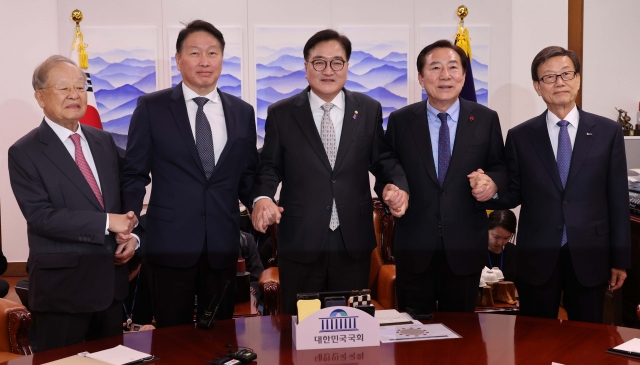Economy's biggest fear is uncertainty, says SK chief
 From left: Korea Enterprises Federation Chairman Sohn Kyung-shik, Korea Chamber of Commerce and Industry Chairman Chey Tae-won, National Assembly Speaker Woo Won-shik, Korea Federation of SMEs Chairman Kim Ki-moon and Korea International Trade Association Chairman Yoon Jin-sik pose for a photo during a meeting at the National Assembly in Seoul on Tuesday. (Yonhap)
From left: Korea Enterprises Federation Chairman Sohn Kyung-shik, Korea Chamber of Commerce and Industry Chairman Chey Tae-won, National Assembly Speaker Woo Won-shik, Korea Federation of SMEs Chairman Kim Ki-moon and Korea International Trade Association Chairman Yoon Jin-sik pose for a photo during a meeting at the National Assembly in Seoul on Tuesday. (Yonhap)
SK Group Chairman Chey Tae-won, who also heads the Korea Chamber of Commerce and Industry, on Tuesday urged policymakers to ensure consistent economic policies to support businesses amid growing uncertainty following the National Assembly’s impeachment of President Yoon Suk Yeol over his botched martial law decree.
During a meeting with National Assembly Speaker Woo Won-shik, Chey relayed the business community’s concerns regarding stalled economic bills and the challenge of navigating policy shifts expected under a second Donald Trump administration in Washington.
The session was part of an emergency economic meeting held at the National Assembly, which included leaders from major business lobby groups, such as Korea Enterprises Federation Chairman Sohn Kyung-shik, Korea International Trade Association Chairman Yoon Jin-sik and Korea Federation of SMEs Chairman Kim Ki-moon.
“The economy's biggest fear is uncertainty,” Chey said. “Observing the recent situation, the nation’s external credit rating remains stable, but it is too early to let our guard down.”
Chey emphasized that persistent uncertainty, coupled with slowing growth, could significantly impact macroeconomic indicators. He urged parliament to prioritize stabilizing the economy and to swiftly pass economic legislation, such as the Special Semiconductor Act, which has bipartisan support.
“If noncontentious bills could be passed within the year through bipartisan cooperation, it would send a positive signal that South Korea’s economy is functioning normally and would alleviate concerns over macroeconomic stability,” he said.
KEF Chairman Sohn, who is also chairman of CJ Group, echoed the need for the prompt enactment of critical bills, such as those easing working-hour regulations and increasing subsidies for the semiconductor sector.
“The government should actively pursue legislation to revive the economy, including support for the semiconductor industry,” Sohn said. “At the same time, please carefully reconsider revisions to the Commercial Act or raising the statutory retirement age, as they may burden businesses."
At the meeting, Chey also raised concerns about the upcoming return of Donald Trump to the US presidency, warning of significant policy shifts that could affect South Korean businesses.
“Companies are deeply concerned about the possibility of policy changes under a new administration in the US,” Chey said, adding that there are limits to what businesses can manage on their own.
“We are at a point where government diplomacy is more critical than ever, but under the current circumstances, such diplomacy is difficult to fully exercise,” he said. “We ask for the speaker’s active role in this regard as we urgently need external channels to address these issues.”
In response, Woo acknowledged the economic challenges facing businesses.
“Uncertainty has decreased somewhat with the passing of the impeachment motion, but until the Constitutional Court’s ruling, businesses and the political community must remain calm and work to stabilize the economy,” Woo said.
Woo pledged to prioritize non-controversial economic bills currently stalled in the parliament’s Legislation and Judiciary Committee, with hopes of passing them by the end of the year.
Regarding concerns over impending shifts under a Trump administration, Woo said he plans to send special envoys to key partners, including the US, Japan, China and the European Union, to bolster diplomatic engagement.




